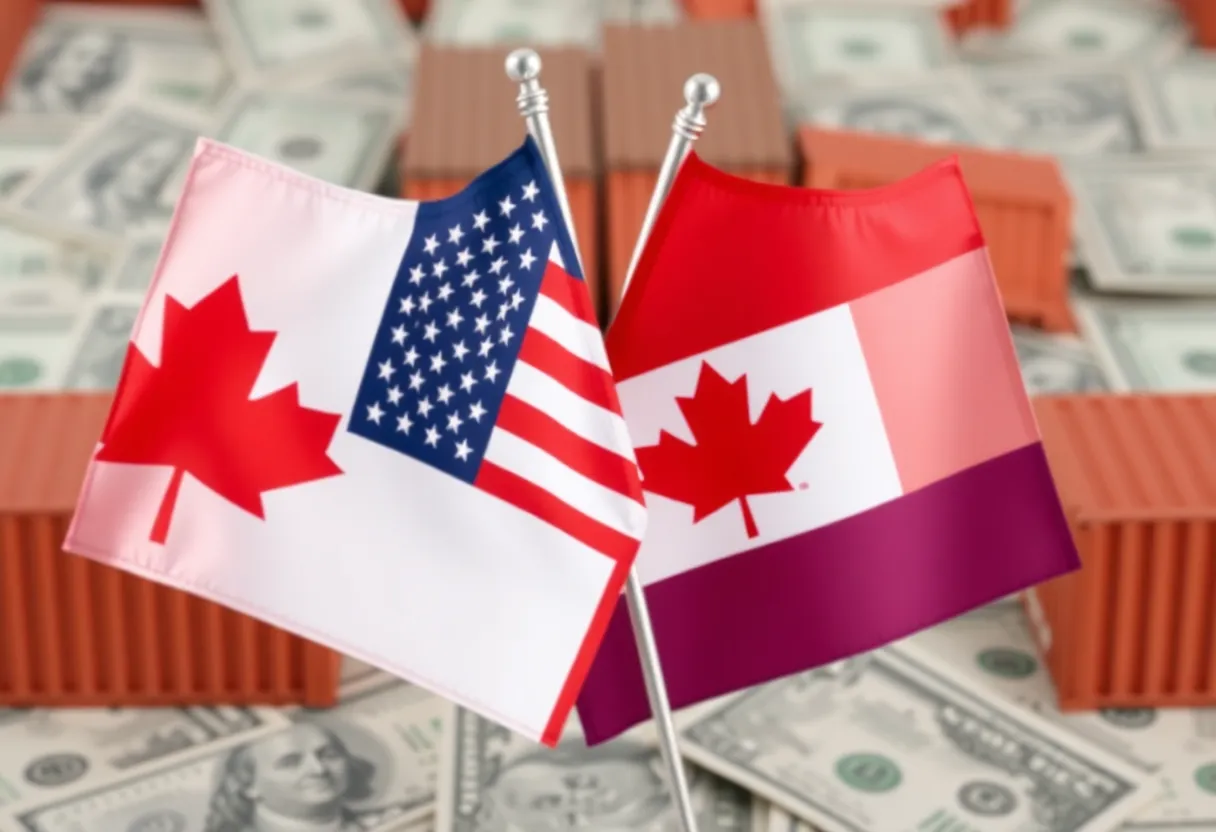News Summary
The relationship between Canada and the U.S. is under pressure as President Trump alleges a $200 billion subsidy that Canada receives from the U.S. This assertion has been dismissed by the White House, with the focus shifting to the $35.661 billion trade deficit. Concerns are growing among Canadians about travel to the U.S., compounded by Trump’s criticism of Canada’s drug enforcement policies. As trade tensions escalate, the potential for retaliatory tariffs raises the stakes in an already complicated trade dynamic.
Washington D.C. — Relations between Canada and the United States are currently under strain, with President Donald Trump alleging that Canada benefits from a $200 billion subsidy from the U.S. during discussions with Canadian Prime Minister Mark Carney. This claim has been dismissed by the White House as a misinterpretation of the U.S. trade deficit with Canada and military expenditure. The ongoing trade disputes have ignited significant concern among Canadian citizens regarding travel to the United States, as criticism of Canada’s handling of drug enforcement has been highlighted by Trump.
The U.S. trade deficit with Canada for goods and services reached approximately $35.661 billion in 2024. Economists argue that designating a trade deficit as a subsidy is erroneous, as subsidies typically refer to unreciprocated gifts. In addition to this, Canada’s defense spending in 2024 stood at $29.3 billion, roughly 1.3% of its GDP, while the U.S. expenditure was significantly higher at $997 billion, or 3.4% of its GDP. To meet NATO’s defense spending target of 2%, Canada would need to increase its defense budget to around $44.82 billion.
Trump’s administration contends that the U.S. covers about 60% of NORAD operational costs based on a 1985 cost-sharing agreement, which has led to claims of financial overburdening by the U.S. However, labeling these contributions as subsidies has raised concerns among economists, who urge a focus on the potential economic benefits of trade, rather than viewing deficits in a negative light. The broader economic implications, especially with persistent trade deficits, could suggest a dependence on foreign economies possibly leading to national security issues.
As tensions mount, there is growing dissatisfaction among Americans who perceive themselves as unfairly subsidizing foreign governments. A Canadian writer has expressed apprehension about visiting the U.S. under the current climate, citing the perception among Americans that they are considered the “patsy” in international negotiations. Many Americans are tired of systemic issues related to the national debt, now standing at approximately $36.92 trillion, further fueling sentiments of isolationism. A notable portion of the American population, including retirees, individuals on welfare, and government employees, do not contribute to tax revenues, which complicates the economic narrative further.
The letter from the Canadian writer articulated a belief that if tariffs on U.S. goods were eliminated, Canada might reciprocate by lifting tariffs on Canadian exports in a bid to enhance trade dynamics. Such assertions underline the complexities of current trade negotiations and the potential for retaliatory tariffs, which could exacerbate existing tensions.
In tandem with these diplomatic issues, economic pressures are manifesting in various sectors, such as the gaming industry in Las Vegas, where casinos recently reported price increases amid inflation concerns. Critics argue that there is a lack of adequate response from regional governors regarding these economic realities, drawing connections between local price hikes and broader national issues.
As trade tensions continue and political dynamics shift, observers are wary of the ramifications these exchanges could have on U.S.-Canada relations. Ongoing disputes highlight the delicate balance needed between addressing trade deficits and further solidifying economic and political alliances. Lawmakers and economists alike stress the importance of clear, factual dialogues to navigate these challenges, ensuring that the long-standing partnership between Canada and the U.S. does not face irreversible damage.
Deeper Dive: News & Info About This Topic
HERE Resources
Las Vegas Businesses Struggle as Canadian Tourism Declines
Additional Resources
- AP News: Trump on Canada Trade Deficit
- Wikipedia: Trade Deficit
- Washington Post: Trump Canada Subsidy Claim False
- Google Search: US Canada Trade Relations
- CNN: US Trade Deficit with Canada
- Encyclopedia Britannica: Trade
- WSJ: Canada’s Aluminum Subsidies
- Google News: Canada US Trade Deficit

Author: STAFF HERE LAS VEGAS WRITER
The LAS VEGAS STAFF WRITER represents the experienced team at HERELasVegas.com, your go-to source for actionable local news and information in Las Vegas, Clark County, and beyond. Specializing in "news you can use," we cover essential topics like product reviews for personal and business needs, local business directories, politics, real estate trends, neighborhood insights, and state news affecting the area—with deep expertise drawn from years of dedicated reporting and strong community input, including local press releases and business updates. We deliver top reporting on high-value events such as Electric Daisy Carnival, World Series of Poker, and Consumer Electronics Show. Our coverage extends to key organizations like the Las Vegas Chamber of Commerce and Three Square Food Bank, plus leading businesses in hospitality and entertainment that power the local economy such as MGM Resorts International, Caesars Entertainment, and Las Vegas Sands. As part of the broader HERE network, we provide comprehensive, credible insights into Nevada's dynamic landscape.



